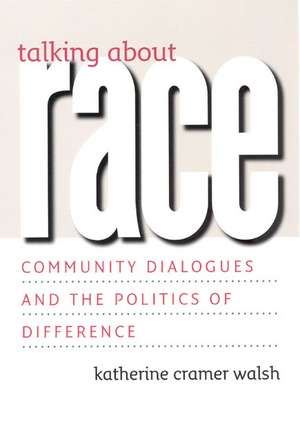Talking about Race: Community Dialogues and the Politics of Difference: Studies in Communication, Media, and Public Opinion
Autor Katherine Cramer Walshen Limba Engleză Paperback – 15 mai 2007
It is a perennial question: how should Americans deal with racial and ethnic diversity? More than 400 communities across the country have attempted to answer it by organizing discussions among diverse volunteers in an attempt to improve race relations. In Talking about Race, Katherine Cramer Walsh takes an eye-opening look at this strategy to reveal the reasons behind the method and the effects it has in the cities and towns that undertake it.
With extensive observations of community dialogues, interviews with the discussants, and sophisticated analysis of national data, Walsh shows that while meeting organizers usually aim to establish common ground, participants tend to leave their discussions with a heightened awareness of differences in perspective and experience. Drawing readers into these intense conversations between ordinary Americans working to deal with diversity and figure out the meaning of citizenship in our society, she challenges many preconceptions about intergroup relations and organized public talk. Finally disputing the conventional wisdom that unity is the only way forward, Walsh prescribes a practical politics of difference that compels us to reassess the place of face-to-face discussion in civic life and the critical role of conflict in deliberative democracy.
With extensive observations of community dialogues, interviews with the discussants, and sophisticated analysis of national data, Walsh shows that while meeting organizers usually aim to establish common ground, participants tend to leave their discussions with a heightened awareness of differences in perspective and experience. Drawing readers into these intense conversations between ordinary Americans working to deal with diversity and figure out the meaning of citizenship in our society, she challenges many preconceptions about intergroup relations and organized public talk. Finally disputing the conventional wisdom that unity is the only way forward, Walsh prescribes a practical politics of difference that compels us to reassess the place of face-to-face discussion in civic life and the critical role of conflict in deliberative democracy.
Preț: 202.07 lei
Preț vechi: 231.16 lei
-13% Nou
Puncte Express: 303
Preț estimativ în valută:
38.67€ • 41.99$ • 32.48£
38.67€ • 41.99$ • 32.48£
Carte indisponibilă temporar
Doresc să fiu notificat când acest titlu va fi disponibil:
Se trimite...
Preluare comenzi: 021 569.72.76
Specificații
ISBN-13: 9780226869070
ISBN-10: 0226869075
Pagini: 317
Ilustrații: 21 tables
Dimensiuni: 152 x 229 x 20 mm
Greutate: 0.48 kg
Editura: University of Chicago Press
Colecția University of Chicago Press
Seria Studies in Communication, Media, and Public Opinion
ISBN-10: 0226869075
Pagini: 317
Ilustrații: 21 tables
Dimensiuni: 152 x 229 x 20 mm
Greutate: 0.48 kg
Editura: University of Chicago Press
Colecția University of Chicago Press
Seria Studies in Communication, Media, and Public Opinion
Notă biografică
Katherine Cramer Walsh is associate professor of political science at the University of Wisconsin–Madison and the author of Talking about Politics: Informal Groups and Social Identity in American Life, also published by the University of Chicago Press.
Cuprins
Preface ix
1 Race, Dialogue, and the Practice of Community Life
2 Unity and Difference in Civic Life
3 Public Talk That Aims to Listen to Difference
4 The Community Choice to Pursue Interracial Dialogue
5 Choosing the Action of Talk
6 Negotiating Unity and Difference
7 Scrutinizing and Listening to Stories
8 Authority and Legitimacy in Dialogue
9 Public Officials and Residents in Dialogue
10 Beyond Romance and Demons
1 Race, Dialogue, and the Practice of Community Life
2 Unity and Difference in Civic Life
3 Public Talk That Aims to Listen to Difference
4 The Community Choice to Pursue Interracial Dialogue
5 Choosing the Action of Talk
6 Negotiating Unity and Difference
7 Scrutinizing and Listening to Stories
8 Authority and Legitimacy in Dialogue
9 Public Officials and Residents in Dialogue
10 Beyond Romance and Demons
Methods Appendix
Notes
Bibliography
Index
Notes
Bibliography
Index

















